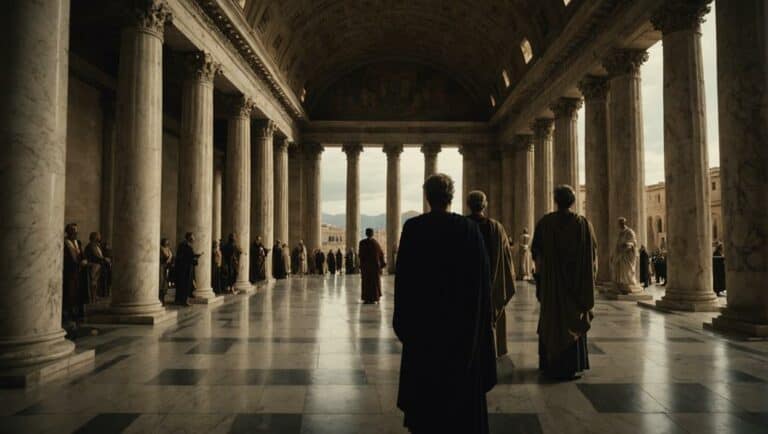The Roman Senate, once a formidable political entity post-monarchy in 509 BCE, evolved from a Patrician advisory council to a body influencing laws, finances, and foreign policy.
Discover how power struggles and Augustus's rise transformed it from a powerhouse to a ceremonial relic, shaping future legislative systems globally.
Origins of the Roman Senate
The origins of the Roman Senate date back to 509 BCE, when it was established following the overthrow of the Roman monarchy. In the early Roman Republic, the Senate was formed to provide a governing body that could advise the newly appointed consuls. Initially, this assembly was primarily composed of individuals from the Patrician class, the elite families of Rome who held significant social and political power. These Patricians served as advisors, using their experience and status to influence decisions and guide the fledgling republic.
The Senate wasn't just a static institution but an evolving one. As Rome faced new challenges and expanded its territories, the Senate's role grew in importance. Senators, often former magistrates such as quaestors and consuls, brought their administrative and military expertise to the table. The censors, responsible for maintaining the list of Senators, made certain that only those with the necessary experience and credibility could participate.
Senate Structure and Composition
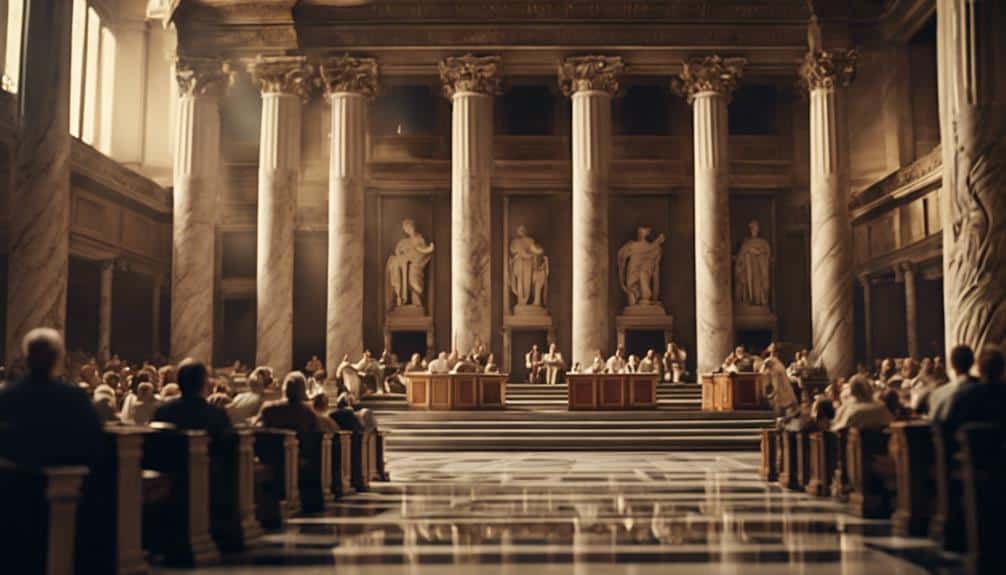
Initially formed of advisors appointed by consuls, the Roman Senate primarily consisted of individuals from the Patrician class who wielded significant political influence. As an advisory council, the Senate's membership included former magistrates like quaestors and consuls, chosen based on their experience and governance expertise. This practice ensured that the Senate was composed of knowledgeable and seasoned individuals.
The censors, key officials in the Roman political system, controlled the Senate's membership. They maintained the list of Senators, known as the album senatorium, and guaranteed that members met criteria such as property ownership and ethical conduct. This allowed the Senate to maintain a degree of integrity and stability in its ranks.
Consuls presided over Senate meetings, directing discussions, debates, and votes on important legislative matters, including laws, resolutions, and appointments. The Senate's structure was further organized into committees, each handling specific issues. This hierarchical system allowed the Senate to function efficiently and address a wide range of topics systematically.
Through this structured and hierarchical composition, the Roman Senate established itself as a central authority in the Roman Republic, wielding significant legislative power and influence over the state's political landscape.
Powers and Functions
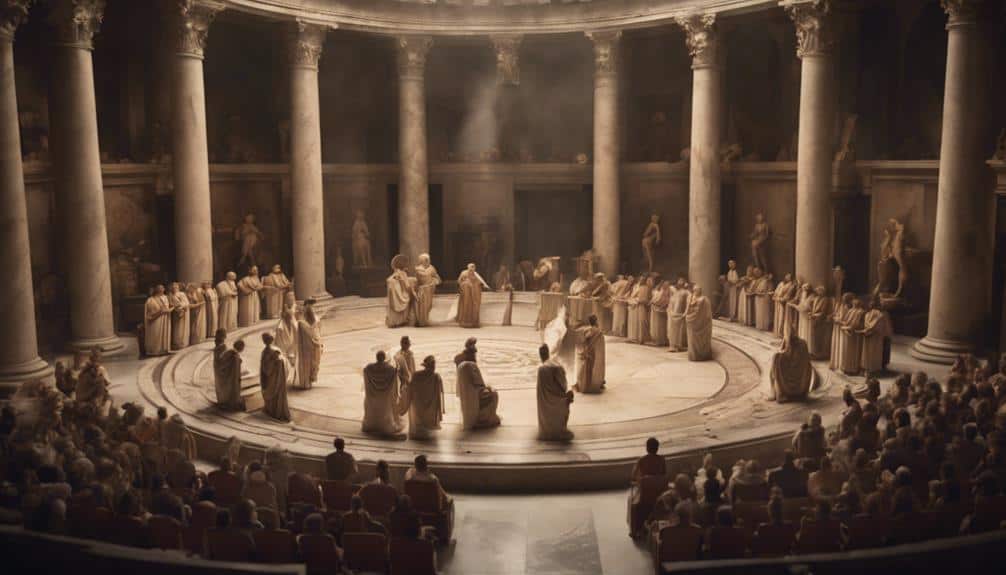
Building on the Senate's structured composition, its powers and functions encompassed proposing and debating laws, managing finances, and influencing foreign policy decisions. The Roman Senate wielded significant authority in shaping legislative frameworks. Senators would propose laws, engage in rigorous debate, and then vote on the legislation. This process guaranteed that diverse viewpoints were considered before any law was enacted.
In terms of financial management, the Senate controlled public expenditures and revenues. They decided on matters such as taxation and public spending, playing an important role in maintaining the economic stability of the Roman state.
When it came to foreign policy, the Senate's influence was paramount. They negotiated treaties, declared wars, and managed diplomatic relations, thereby steering Rome's interactions with other states.
The Senate also nominated and confirmed magistrates, including high offices like consuls and praetors. They had the authority to appoint individuals to priesthoods, adding a religious dimension to their political power. Additionally, the Senate held judicial powers, particularly in cases involving magistrates. Various Senate committees dealt with specific issues, reflecting a hierarchical and organized system.
Consuls, as former magistrates, presided over meetings, making sure that the Senate's proceedings were conducted with proper ritual and order.
Conflicts and Challenges
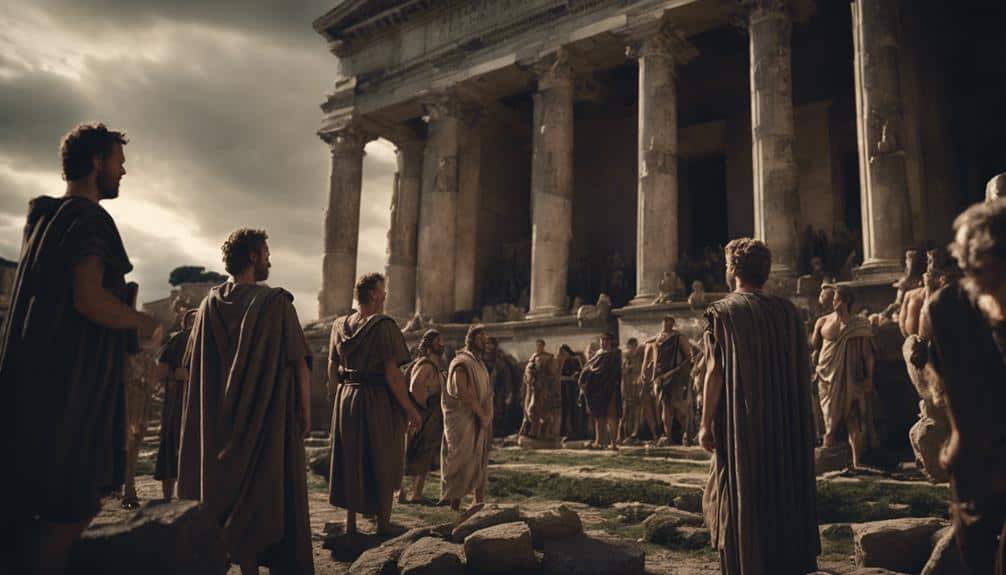
You can trace the Senate's conflicts and challenges to its power struggles with the Populares faction, which fiercely advocated for the rights of the common people. These conflicts put immense pressure on the Senate's authority and highlighted the deep divisions within Roman political life.
The Social War (91-88 BCE) was a major conflict where Rome's Italian allies demanded citizenship and equal rights, challenging Senate authority. The Senate's inability to swiftly resolve these issues exacerbated internal strife and weakened its control.
Moreover, the rise of powerful military leaders such as Julius Caesar and Pompey presented further challenges. Their personal ambitions and support from the Populares faction undermined the Senate's influence and led to significant power struggles.
The First Triumvirate, an informal political alliance between Caesar, Pompey, and Crassus, marginalized the Senate, diminishing its role in governance. This alliance bypassed traditional Senate authority, setting a precedent for future power consolidations.
Key challenges included:
- Social War: Conflict over citizenship rights, weakening Senate control.
- Spartacus's revolt: Tested Senate's ability to maintain order.
- Influential figures: Julius Caesar and Pompey's ambitions.
- First Triumvirate: Marginalized Senate authority.
- Internal divisions: Persistent factionalism within Rome.
These challenges collectively contributed to the Senate's eventual decline.
Transition to the Empire
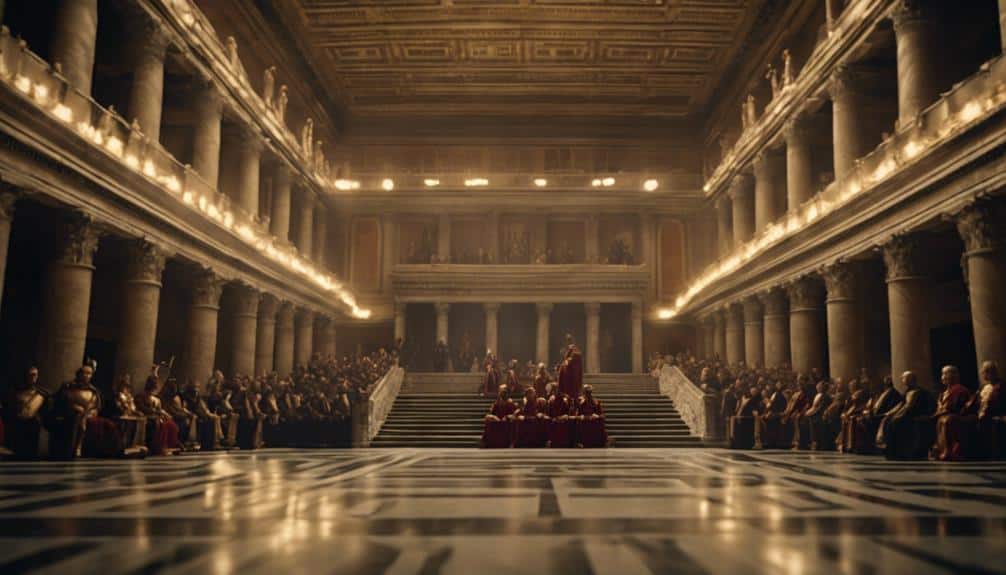
You'll notice that the shift to the Empire greatly altered Rome's political landscape, concentrating power in the hands of emperors.
Julius Caesar's rise and subsequent assassination set the stage for Augustus to consolidate imperial authority, which diminished the Senate's influence.
These changes were accompanied by administrative reforms that redefined governance and shifted the balance of power away from traditional republican structures.
Consolidation of Imperial Authority
The shift to the Roman Empire saw a fundamental alteration in governance as emperors like Augustus consolidated power, relegating the Senate to a more ceremonial role. Augustus, the first Roman Emperor, orchestrated this change through the establishment of the Principate, a system where the emperor held ultimate authority while presenting an illusion of shared power with the Senate. This move drastically reduced the Senate's power, as legislative and decision-making abilities were mostly shifted to the emperor.
Under Augustus, the Senate's former role in governance became largely symbolic. The leading families, once the backbone of senatorial authority, found their influence waning as imperial edicts superseded the Senate's traditional functions. This consolidation of imperial authority marked a pivotal alteration in Roman political structure.
- Centralization of power: Augustus centralized administrative and military control, diminishing the Senate's influence.
- Ceremonial role: The Senate's duties became more advisory and honorary, losing real political clout.
- Leading families' decline: Aristocratic families saw their political power eroded as the emperor's authority grew.
- Principate system: This system gave Augustus the facade of restoring the Republic while actually consolidating autocratic power.
- Reforms and reorganization: Augustus' reforms restructured the government to favor imperial over senatorial authority.
Understanding this transformation highlights how the Roman Senate's power was systematically curtailed in favor of centralized imperial rule.
Diminished Senatorial Influence
During the shift to the Roman Empire, the Senate's influence significantly eroded as emperors like Augustus centralized political power. Augustus, the first emperor, initiated a change where the Senate's role in governance was greatly diminished. By taking on more autocratic authority, emperors reduced the Senate's political relevance, sidelining it in the decision-making process.
Under the Principate, the Senate's power waned notably. Augustus and his successors effectively marginalized the Senate, directing pivotal functions of the state away from the senatorial body and towards a centralized imperial rule. The emperor held the ultimate authority, making the Senate's traditional advisory and legislative roles obsolete.
This shift marked a remarkable transformation in Roman governance. Where once the Senate had been a powerful force, its influence was now notably diminished. Emperors operated with near-absolute power, rendering the Senate a ceremonial institution rather than a political powerhouse. The change to an imperial autocracy was clear, with emperors consolidating control and reducing the Senate's ability to impact political affairs.
This decline in senatorial influence underscores the profound changes in the structure of Roman political life during the empire's early years.
Administrative Reforms and Changes
Reorganizing the administrative structure of the Roman state, Augustus implemented significant reforms that shifted power away from the Senate and solidified his control over the empire. By consolidating authority, Augustus transformed the Senate into a more ceremonial body, reducing its administrative role.
To achieve this, Augustus introduced several key changes:
- Senate Meetings: Augustus reduced the frequency and importance of Senate gatherings, directing major decisions to be made by the emperor.
- Provincial Reorganization: He divided provinces into those controlled directly by the emperor and those managed by the Senate, with the more vital and wealthier provinces under imperial control.
- Military Reforms: Augustus took direct command of the Roman legions, ensuring the army's loyalty shifted from the Senate to the emperor.
- Taxation Systems: The emperor reformed tax collection, centralizing the process to reduce corruption and increase efficiency, thereby reducing the Senate's influence.
- Centralized Authority: Augustus established a bureaucracy that reported directly to him, bypassing traditional senatorial channels.
These administrative reforms marked a clear shift from the Roman Republic, where the Senate held significant power, to an Empire characterized by centralized imperial authority. Understanding these changes provides insight into how Augustus reshaped Roman governance, leading to the Senate's decline as a political powerhouse.
Decline in Influence

As you examine the decline in the Roman Senate's influence, you'll notice the emperors' consolidation of power greatly marginalized its authority.
This erosion of legislative power was compounded by internal power struggles among influential figures and factions.
Ultimately, these dynamics led to the Senate's rapid decline and disappearance by the early 7th century, marking a pivotal shift in Roman governance.
Imperial Authority Ascendance
The consolidation of imperial authority systematically eroded the Roman Senate's influence, culminating in its political irrelevance by the time of Diocletian's reforms. As emperors began to centralize power during the Principate, the Senate's role in governance saw a noticeable decline. The shift from a republican model to an autocratic one meant that the Senate no longer held its former status as the ultimate repository of supreme power.
By the time of Diocletian, the Senate's influence had waned significantly. His reforms further marginalized this once-powerful body, stripping it of many of its remaining responsibilities. The Senate's importance in the administrative and military affairs of the empire diminished rapidly, leading to its near disappearance in the early 7th century.
Key factors in the Senate's decline include:
- Centralization of power under emperors: Emperors consolidated authority, diminishing the Senate's role.
- Diocletian's reforms: These changes rendered the Senate politically irrelevant.
- Wars and political unrest: These events reduced the Senate's influence and effectiveness.
- Justinian I's actions: His abolition of most senatorial offices in Italy further weakened the senatorial order.
- Changing administrative needs: The evolving structure of the Roman state required different governance models, sidelining the Senate.
Understanding these dynamics is essential to comprehending the Senate's fall from grace.
Erosion of Legislative Power
Emperors, by consolidating authority, precipitated a significant decline in the Roman Senate's legislative power, diminishing its role in decision-making processes. Over time, the Senate's ability to propose and debate laws diminished as emperors like Augustus centralized legislative control within the imperial structure. This shift wasn't merely symbolic; it marked the Senate's evolution from a powerful governing body to a largely ceremonial institution.
As you examine the changes, you'll notice that the Senate's legislative power eroded gradually but steadily. Emperors increasingly bypassed the Senate, issuing edicts and decrees that carried the force of law. This erosion of legislative power was pivotal in reducing the Senate's influence over Roman governance, relegating it to a supportive role rather than a decision-making authority.
The decline in the Senate's legislative power also signaled a broader shift towards autocratic rule. By monopolizing legislative functions, emperors undermined the Senate's historical role and paved the way for the transformation of Rome into an empire. This centralization of power under the emperors marked a definitive end to the Senate's influence, embodying the evolution from a republican form of governance to one dominated by imperial autocracy.
The Ceremonial Senate
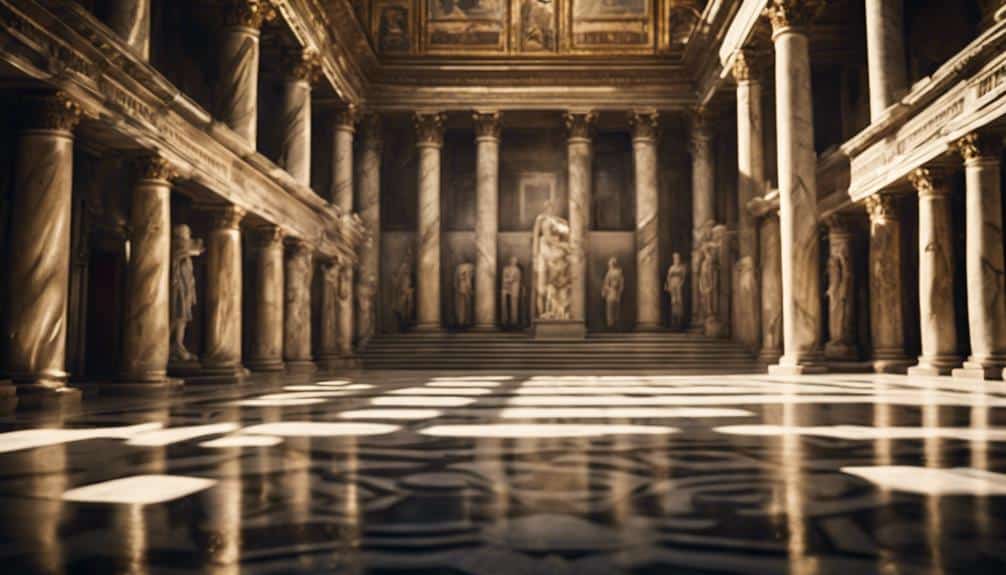
Although it retained its historical significance, the Ceremonial Senate of the early Middle Ages had largely lost its governing power to the emperors. This transformation marked a significant evolution in Roman governance, where the Senate shifted from a powerful legislative body to a symbolic entity.
As emperors consolidated their control, the Senate's role became more ceremonial, reflecting the broader shift from the Roman Republic to the Roman Empire.
The Ceremonial Senate still served as a reminder of Rome's storied past, retaining its importance as a symbol of tradition. Despite its diminished influence, it continued to be a fixture in Roman political life, albeit with far less authority. Here are key aspects of this evolution:
- Symbolic Role: The Senate's primary function was to uphold Roman traditions and ceremonial duties.
- Emperors' Dominance: Real political power rested with the emperors, who made pivotal decisions unilaterally.
- Historical Significance: The Senate remained a vestige of the Republic, embodying Rome's historical legacy.
- Evolution of Governance: This shift illustrated the broader evolution from a republic to an imperial system.
- Public Perception: The Senate's continued existence provided a sense of continuity for Roman citizens.
Understanding the Ceremonial Senate underscores the complex dynamics of power and tradition in ancient Rome.
Legacy and Impact
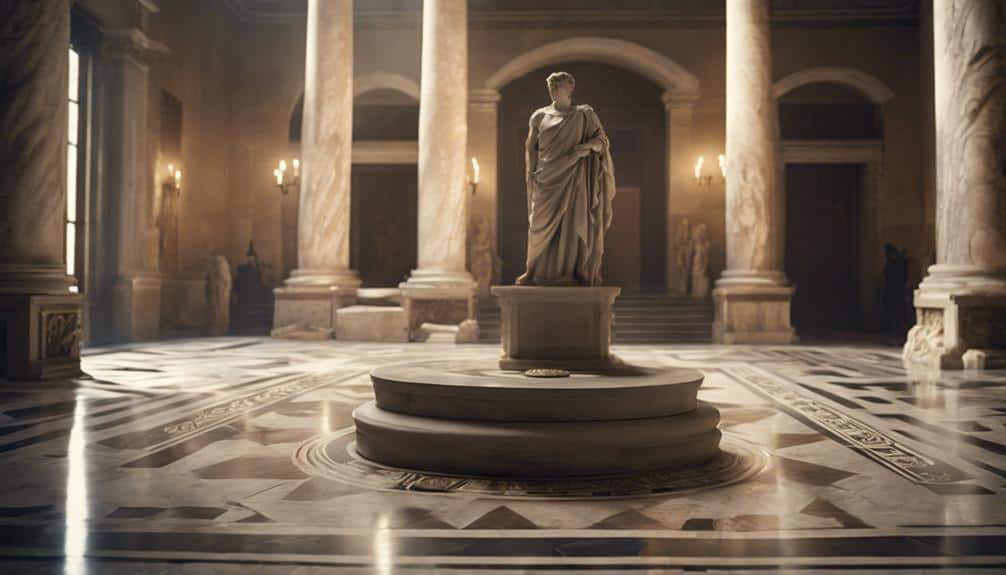
As the Senate's ceremonial role highlighted Rome's shift from republic to empire, its legacy and impact continue to resonate through history, shaping modern political thought and governance structures.
The Roman Senate, originally a critical legislative body in the early Republic, influenced the appointment of kings, managed state affairs, and had a significant say in the appointment of magistrates. These functions laid the groundwork for future legislative bodies and democratic institutions worldwide.
The decline of the Roman Senate, marked by wars and political reforms, led to its disappearance in the West, yet its influence persisted. Throughout history, the title of senator has been revived in various contexts, reflecting the enduring legacy of the Roman Senate's structure and authority.
Modern parliaments and senates draw inspiration from this ancient institution, embracing the concept of a deliberative assembly that balances power and represents the will of the people.
Primary and secondary sources offer valuable insights into the Senate's workings, providing a thorough understanding of its role over centuries. By examining these sources, you can appreciate how the Roman Senate's legacy continues to shape contemporary legislative practices and political ideologies.
Scholarly Perspectives
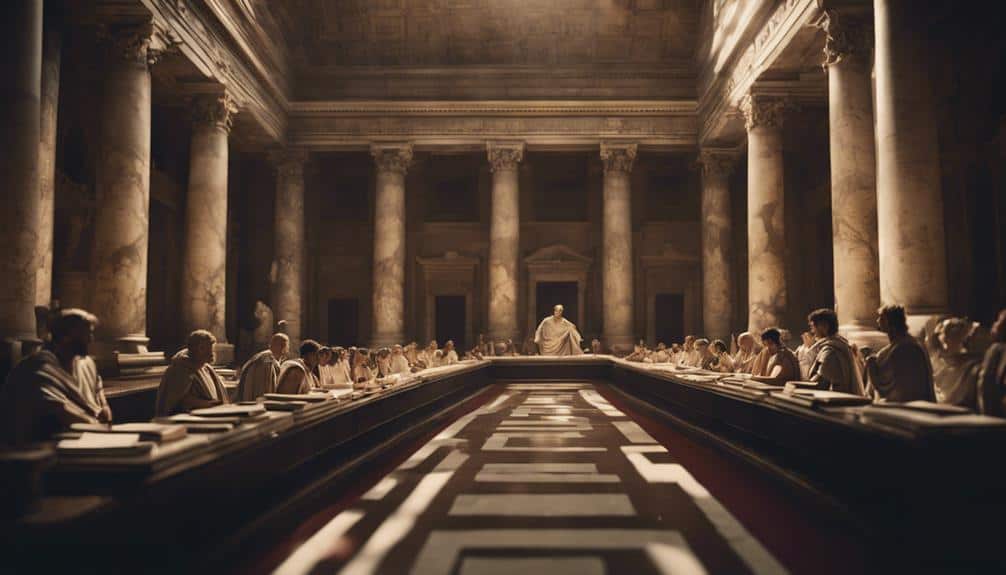
Examining scholarly perspectives on the Roman Senate reveals a nuanced understanding of its historical significance and its influence on modern political systems. Early modern views of the Roman Senate have been shaped by a range of sources, reflecting its complex and multifaceted role in ancient Rome.
Modern scholarship hasn't extensively explored the contemporary significance of the Roman Senate, leaving a gap in our understanding. Early modern thinkers like Machiavelli largely focused on other aspects of ancient Rome, often excluding the Senate from their analyses. However, the Senate's political significance wasn't entirely overlooked.
- The Polish royal council was named the 'senate' to deliberately echo its Roman counterpart, highlighting the enduring influence of Roman political structures.
- Early modern views can be found in a variety of texts, including scholarly, historical, and political writings.
- Even Shakespeare's plays offer insights into how the Roman Senate was perceived during the early modern period.
- These perspectives contribute to our understanding of the Senate's role in shaping governance and political thought.
- Scholars today continue to explore these historical interpretations to better grasp the Senate's long-term impact.


